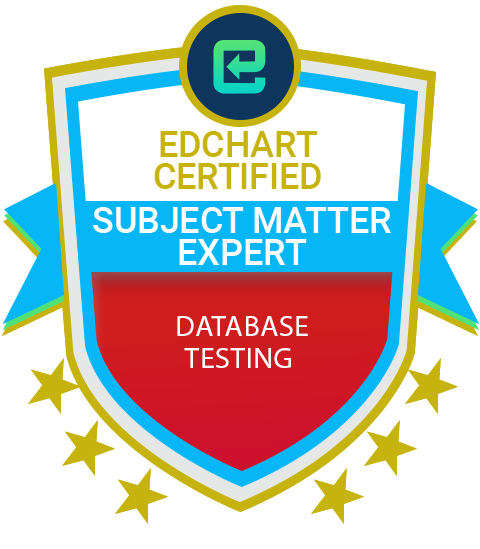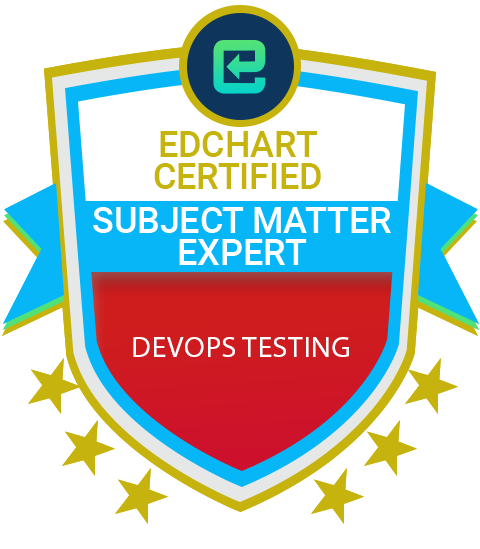
Edchart Certified
Cloud Application Testing SME
In today's digital era, cloud computing has become the backbone of many businesses. From startups to global corporations, applications are being hosted and deployed in the cloud due to its flexibility, scalability, and cost-effectiveness. However, as cloud environments grow in complexity, the need for rigorous testing of these applications becomes essential. That’s where the Cloud Application Testing Certification comes into play.
Cloud Application Testing Certification | cloud application testing | cloud migration testing Certification | cloud based testing platform Certification | cloud test automation Certification | cloud mobile app testing Certification | cloud app testing Certification | cloud mobile device testing Certification | cloud testing platform Certification | aws mobile app testing Certification | cloud software testing | cloud native application testing | cloud based mobile app testing | cloud based software testing | cloud based application testing | testing on cloud applications | cloud application testing tools | cloud application security testing | performance testing cloud applications | cloud based mobile application testing
| India: |
|
|---|---|
|
Other Countries: |
|
Cloud Application Testing Certification: Elevate Your Testing Skills for the Cloud
In an era where cloud computing dominates the tech landscape, having expertise in Cloud Application Testing Certification is crucial for ensuring the reliability and performance of cloud applications. This certification validates your ability to effectively test applications in a cloud environment, ensuring they meet the highest standards of quality and functionality.
Cloud Application Testing Certification is designed for professionals who wish to specialize in testing cloud applications. It encompasses various testing methodologies, tools, and best practices to ensure that cloud-based applications are robust, secure, and user-friendly.
Description of Cloud Application Testing Certification
The Cloud Application Testing Certification offers a comprehensive curriculum designed to equip testers with the skills needed to handle the complexities of cloud environments. This certification covers a range of topics including cloud service models (IaaS, PaaS, SaaS), cloud security, performance testing, and more. By earning this certification, you demonstrate your ability to perform end-to-end testing of cloud applications, from functional testing to load testing and security assessments.
Understanding cloud-specific challenges such as scalability, integration, and multi-tenancy is crucial. This certification ensures that you are proficient in using specialized tools and techniques to address these challenges effectively. With the rise of cloud-native applications, having this certification can set you apart in the competitive job market, showcasing your expertise in a critical area of software testing.
Skills Required for Cloud Application Testing Certification
To achieve Cloud Application Testing Certification, professionals must possess a range of skills:
- Understanding of Cloud Environments: Knowledge of cloud service models and deployment strategies is essential for effective testing.
- Testing Tools Proficiency: Familiarity with cloud-based testing tools and platforms is necessary for executing various testing types.
- Performance Testing Skills: Ability to perform load testing and analyze performance metrics to ensure scalability.
- Security Testing: Skills in identifying and mitigating security vulnerabilities in cloud applications.
These skills are crucial for ensuring that cloud applications perform optimally under different conditions and meet all user requirements.
Scopes of Cloud Application Testing Certification
The scope of Cloud Application Testing Certification extends across multiple areas within the cloud computing landscape. Certified professionals can work on:
- Cloud Migration Testing: Verifying the success of migrating applications to the cloud.
- Performance Testing: Ensuring applications perform well under various load conditions.
- Security Testing: Identifying potential security risks in cloud applications.
- Integration Testing: Validating integration between different cloud services and platforms.
This broad scope ensures that certified professionals are equipped to handle various challenges in cloud application testing, making them valuable assets in any organization’s IT team.
Pros and Cons of Cloud Application Testing Certification
Pros:
- Enhanced Skills: Provides advanced knowledge and skills required for testing cloud applications.
- Career Advancement: Opens up opportunities for career growth and higher-paying roles.
- Industry Recognition: Certification from a recognized provider like EdChart and Credly adds credibility to your professional profile.
Cons:
- Cost: Certification may involve fees for training and examination.
- Continuous Learning: The fast-evolving nature of cloud technologies requires ongoing learning and re-certification.
- Complexity: The certification process can be challenging, requiring significant preparation.
Balancing these pros and cons will help you make an informed decision about pursuing the certification.
Features of Cloud Application Testing Certification
The Cloud Application Testing Certification comes with several key features:
- Comprehensive Curriculum: Covers all essential aspects of cloud application testing.
- Hands-On Experience: Provides practical knowledge through real-world scenarios and tools.
- Global Recognition: Certification by EdChart and Credly ensures international recognition and credibility.
- Updated Content: Regular updates to the curriculum to reflect the latest trends and technologies in cloud computing.
These features ensure that the certification remains relevant and valuable in the ever-evolving field of cloud application testing.
Why Should One Take Cloud Application Testing Certification?
Pursuing Cloud Application Testing Certification is beneficial for several reasons:
- Career Growth: It enhances your skill set and opens up new career opportunities in cloud testing.
- Industry Demand: With increasing adoption of cloud technologies, there is a growing demand for skilled professionals.
- Professional Credibility: Certification demonstrates your commitment to maintaining high standards in cloud application testing.
By earning this certification, you position yourself as a knowledgeable professional capable of handling the complexities of modern cloud environments.
Who Will Benefit from Taking Cloud Application Testing Certification?
The Cloud Application Testing Certification is ideal for:
- Software Testers: Who wish to specialize in cloud-based testing.
- Quality Assurance Professionals: Looking to enhance their expertise in testing cloud applications.
- IT Managers: Who need to ensure their teams are skilled in cloud application testing.
- Developers: Interested in understanding the testing aspects of cloud environments.
This certification will benefit anyone involved in the development, deployment, or management of cloud applications by providing them with essential testing skills.For more information on how to achieve the Cloud Application Testing Certification and boost your career in cloud computing, visit EdChart, a global leader in online certifications, and partner with Credly for internationally recognized credentials.
As the cloud computing industry continues to grow, Cloud Application Testing Certification has become increasingly valuable. This certification helps professionals demonstrate their proficiency in testing cloud-based applications, ensuring they meet high performance, security, and reliability standards. If you're preparing for an interview for a role that requires this certification, here are the top 10 interview questions you might encounter, along with tips on how to answer them effectively.
1. What is Cloud Application Testing and Why is it Important?
Cloud Application Testing involves evaluating applications hosted on cloud platforms to ensure they perform well, remain secure, and meet user expectations. This type of testing is crucial because it addresses the unique challenges of cloud environments, such as scalability, multi-tenancy, and integration with other cloud services.
Cloud Application Testing Certification prepares professionals to handle these challenges effectively, making this testing essential for the reliability and security of cloud applications.
2. Can You Explain the Different Types of Cloud Testing?
There are several types of cloud testing, including:
- Functional Testing: Validates that the application behaves according to requirements.
- Performance Testing: Assesses the application's responsiveness and stability under various conditions.
- Security Testing: Identifies vulnerabilities and ensures data protection.
- Compatibility Testing: Ensures the application works across different cloud environments and devices.
Cloud Application Testing Certification will cover these areas, providing a well-rounded understanding of each testing type.
3. How Do You Approach Testing Cloud Security?
Testing cloud security involves evaluating the application for potential vulnerabilities and ensuring that data is protected. Key practices include:
- Conducting Risk Assessments: Identifying potential security threats.
- Performing Penetration Testing: Simulating attacks to uncover weaknesses.
- Ensuring Compliance: Verifying adherence to security standards and regulations.
Being certified in Cloud Application Testing Certification equips you with the skills to implement these practices effectively.
4. What Tools and Techniques Are Commonly Used in Cloud Testing?
Common tools and techniques include:
- Load Testing Tools: Such as JMeter or LoadRunner.
- Security Testing Tools: Like OWASP ZAP or Burp Suite.
- Automation Tools: Such as Selenium for functional testing.
- Monitoring Tools: For performance and resource usage tracking.
Knowledge of these tools is often covered in the Cloud Application Testing Certification program.
5. How Do You Ensure Scalability in Cloud Applications?
Ensuring scalability involves:
- Performance Testing: To gauge how the application handles increased loads.
- Auto-Scaling: Implementing cloud features that automatically adjust resources based on demand.
- Load Balancing: Distributing workloads evenly across multiple servers.
The Cloud Application Testing Certification will prepare you to address these scalability issues effectively.
6. What Are the Common Challenges in Cloud Application Testing?
Common challenges include:
- Complexity of Cloud Environments: Managing diverse configurations and services.
- Data Security: Ensuring that data remains protected in a shared environment.
- Integration Issues: Testing applications that interact with other cloud services.
These challenges are addressed in the Cloud Application Testing Certification training, helping you develop strategies to overcome them.
7. How Do You Perform Performance Testing in the Cloud?
Performance testing in the cloud involves:
- Simulating Load: Using tools to mimic user activity and assess application performance.
- Analyzing Metrics: Monitoring response times, throughput, and resource utilization.
- Optimizing Performance: Based on test results, making adjustments to improve efficiency.
Cloud Application Testing Certification covers these techniques comprehensively.
8. What is the Role of Automation in Cloud Application Testing?
Automation plays a crucial role by:
- Increasing Efficiency: Automated tests can be run more frequently and quickly than manual tests.
- Ensuring Consistency: Reduces human error and ensures that tests are executed uniformly.
- Facilitating Continuous Integration/Continuous Deployment (CI/CD): Integrates testing into the development process.
The Cloud Application Testing Certification emphasizes the importance of automation in modern cloud testing practices.
9. How Do You Manage Testing for Multi-Tenant Cloud Environments?
Testing for multi-tenant environments involves:
- Data Isolation: Ensuring that data between different tenants is kept separate.
- Resource Allocation: Managing shared resources to prevent performance issues.
- Security Testing: Verifying that tenants cannot access each other’s data.
These aspects are integral to the Cloud Application Testing Certification curriculum.
10. How Do You Stay Updated with Cloud Testing Trends and Tools?
Staying updated involves:
- Continuing Education: Enrolling in relevant courses and certifications.
- Following Industry News: Keeping up with new tools and trends through blogs, forums, and conferences.
- Participating in Professional Networks: Engaging with other professionals in the field.
The Cloud Application Testing Certification can be a part of your ongoing education, helping you stay current with best practices and emerging technologies.
| Exam Timing: | 60 (Mins) |
|---|---|
| Pass Per | 60% |
| Level | Expert |
| Roles | Software Testing |
| No. of Questions | 30 |
Related Products
International Recognized Certificates
Get Your Verifiable and Shareable International Digital Certificates
Industry-oriented Skill Sets
Industry experts suggested knowledge-centric Certificates
Edchart Global User Profile
Edchart Global User Profile for each candidate to share and have.




